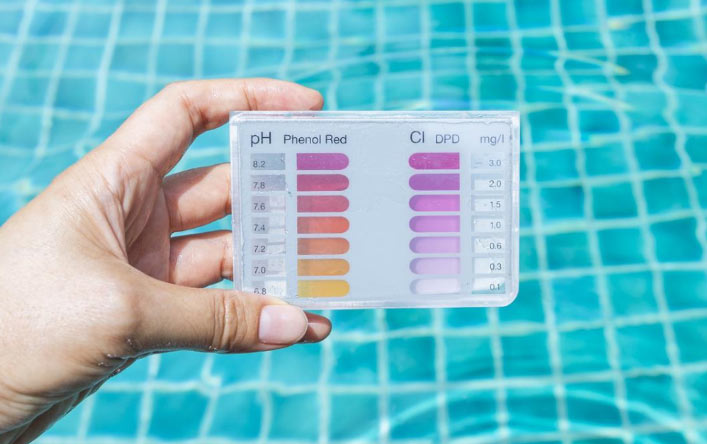

Now that summer is just around the corner, it is about time to get ready and start using your pool more often. The weather will soon be perfect for enjoying a refreshing swim or letting the kids splash around while still remaining socially distant and safe at home. This is why it is important to test your pool water as soon as possible to ensure it is sanitary and will be ready to enjoy. So how often should you test your pool water?
The answer is, regularly. A pool water test kit can be handy, and it will tell you what needs to be cleaned or adjusted. But in most cases, hiring a professional will take out all of the guess work leaving more free time to enjoy the pool. If you are still interested in knowing how to analyze your water, we’ve put together a handy list of what you should be testing for and when.
Topics Covered
Chlorine is the most important chemical to add to your pool because it effectively sanitizes it.
Frequency: You should check your levels at least two or three times a week. If you don’t, your pool water may turn green much faster as the temperature is rising.
pH levels and chlorine work in tandem. If you keep your pH balanced, you will know the chlorine is cleaning your pool water.
Frequency: Two or three times a week. In effect, testing your pH levels should happen on the same days when you check your chlorine.
Total alkalinity or TA is the measure of the pool water’s ability to resist changes in pH. TA is important to check because it acts as a buffer to keep the pH levels balanced.
It is essential for you to know how much TA substances are in your pool water. Unbalanced alkalinity can lead to severe damage to your pool’s structures. If the TA is low, then corrosion, scaling, and staining may result. If TA is high, your water will turn murky.
Frequency: Check your TA levels once a week.
Calcium hardness can also damage your pool. It is important to maintain your calcium hardness because this allows the pool water to be in proper chemical balance with no damaging effects. If the calcium hardness is too low, the water can corrode the surfaces of your pool. If the calcium is too high, the pool water will become cloudy.
Frequency: The good news is that you don’t have to check for calcium hardness frequently. You only have to do this once a month.
5. Total Dissolved Solids (TDS)
Total Dissolved Solids (TDS) is checking all the substances that have dissolved in your pool water. Some common solids that can cause damage are magnesium, sulfates and irons. However, it is important to know this rule: Everything that has been added to your water, increases the TDS and will change the balance of the water. This means airborne things such as dust and falling leaves or debris, dead bugs and other contaminants. This also includes everything a swimmer brings into the water, such as sweat, hair, sunscreen, tanning lotion or oils and grooming products. High TDS levels decrease the efficacy of the chlorine in your pool and can lead to eye and skin irritations for swimmers.
Unfortunately, removing TDS can be difficult. To lower the TDS level, you may have to drain your pool water level down or completely and refill it with fresh water. Pool filters won’t solve the problem, as they do not remove suspended particles in the water.
Frequency: Add fresh water periodically. This will keep your TDS level in check.
Your swimming pool needs regular maintenance if you want to protect your investment and keep your loved ones safe while swimming. You can use a water test kit, but remember, deciphering it can be tricky.
The leading smart lab water testing resource near you is Champions Pool Repair & Services. You can call us at (281) 355-8504 or send us a message at https://championspools.com/contacts/ and we’ll let you know the process to have your pool’s water tested and how we can assist. Trust your safety and summer swimming fun to our expert services and technicians to lengthen the life span of your pool.
